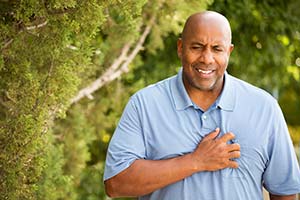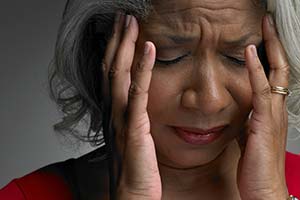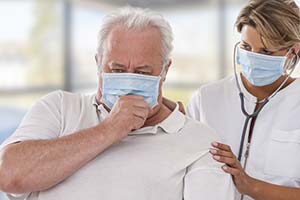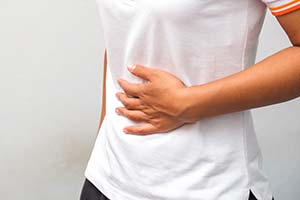Preventing Heart Attacks by Understanding Cardiovascular Risks
Do you know that heart attacks have "beginnings" that can occur days or weeks before an actual attack? It is important to recognize these beginnings, with the help of an EHAC doctor, to help prevent the actual attack and its potential health consequences.
People often mistake the early warning signs of a heart attack, such as chest pain, for heartburn or pulled a muscle. The unfortunate outcome is that many people wait too long before getting help.
At The Hospitals of Providence, we have an EHAC program delivered by a team of cardiologists, nurses and staff who are dedicated to helping men and women recognize the early warning signs of a heart attack. We provide care and treatment options for these
signs and help prevent the emergency from happening.
What Is a Heart Attack?
Each year, approximately 1.2 million Americans suffer a heart attack, also known as a myocardial infarction. It is a medical emergency that occurs when a part of the heart muscle does not get enough blood. This usually happens when fatty deposits build
up over time and form plaque in the heart's arteries, blocking the blood flow. The blockage also limits the oxygen and nutrients that go to your heart.
Heart attacks are sometimes thought to be a man’s problem. But the truth is, more women in the United States die of heart disease each year than men. In general, over 80,000 people die every year from a heart attack and on average, 50% of these
patients displayed, but ignored, the warning signs.
What Are the Early Signs of a Heart Attack?
There are heart attack symptoms in women that are different from heart attack symptoms in men. But the common signs and symptoms they usually share are as follows:
- Chest pain or discomfort: The discomfort usually lasts for more than a few minutes or it may go away and come back. The discomfort may feel like pressure, squeezing, fullness or pain at the center of the chest.
- Discomfort in other areas of the upper body: This may include pain or discomfort in the back, jaw, stomach or in one or both arms.
- Shortness of breath: This may occur with, before or without chest pain or discomfort.
- Breaking out in a cold sweat
- Nausea or light-headedness
Meanwhile, heart attack symptoms in women sometimes go unnoticed. These include the following:
- Back pain
- Dizziness
- Fainting
- Pressure, fullness, squeezing pain in the center of the chest, spreading to the neck, shoulder or jaw
- Unusual fatigue
- Unusual shortness of breath
- Upper abdominal pressure or discomfort
- Vomiting
If you experience these early warning signs of a heart attack, please do not delay care. Schedule an appointment with your cardiologist at The Hospitals of Providence as soon as possible. Treatments are usually most effective when they occur in the early
stages of chest pain, so early treatment is key. In case of a heart attack, call 9-1-1 and seek medical care immediately.
What Are the Risk Factors of a Heart Attack?
Some of the things or conditions that may increase your risk for myocardial infarction may include the following:
- Diabetes
- Excessive alcohol consumption
- Family history of heart disease
- High blood cholesterol
- High blood pressure
- Obesity and being overweight
- Old age
- Physical inactivity
- Smoking
- Too much stress
- Unhealthy diet
How to Prevent a Heart Attack
Aside from working closely with your EHAC doctor and watching out for early warning signs of a heart attack, making some lifestyle changes can also help prevent a heart attack from happening. These lifestyle changes may include, but are not limited to,
the following:
- Being physically active
- Eating and drinking healthy
- Limiting alcohol intake or not drinking at all
- Losing weight or maintaining a healthy weight
- Lowering high blood pressure (if necessary)
- Maintaining healthy cholesterol levels
- Quitting smoking
- Reducing and managing stress
- Treating or managing conditions that can be a risk factors of heart attack such as diabetes
Why Choose The Hospitals of Providence for Your Early Heart Attack Care?
The Hospitals of Providence has EHAC teams who genuinely care about you and your loved ones. Our hospitals are located across El Paso to provide accessible care to the communities in this city and nearby areas. At the same time, we have received multiple
recognitions for the compassionate care and patient-centered cardiovascular services we offer.
Some of the accreditations and recognitions we received in recent years are as follows:
For Sierra Campus
- Chest Pain Reaccreditation by the Society of Cardiovascular Care
- ACC HeartCARE Center Designation by the American College of Cardiology
- Grade A rating for patient safety in the Leapfrog Group’s Fall 2019 Safety Score
Take the EHAC Oath with us.
We encourage you to start taking care of your heart health today. We can kick this commitment off by taking the EHAC oath together.
“I understand that heart attacks have beginnings and on occasion, signs of an impending heart attack may include chest discomfort, shortness of breath, shoulder and/or arm pain and weakness. These may occur hours or weeks before the actual heart
attack. I solemnly swear that if happens to me or anyone I know I will call 9-1-1 or activate Emergency Medical Services.”
Visit Deputy Heart Attack website for more information about heart disease and prevention or click here to download an educational brochure.










